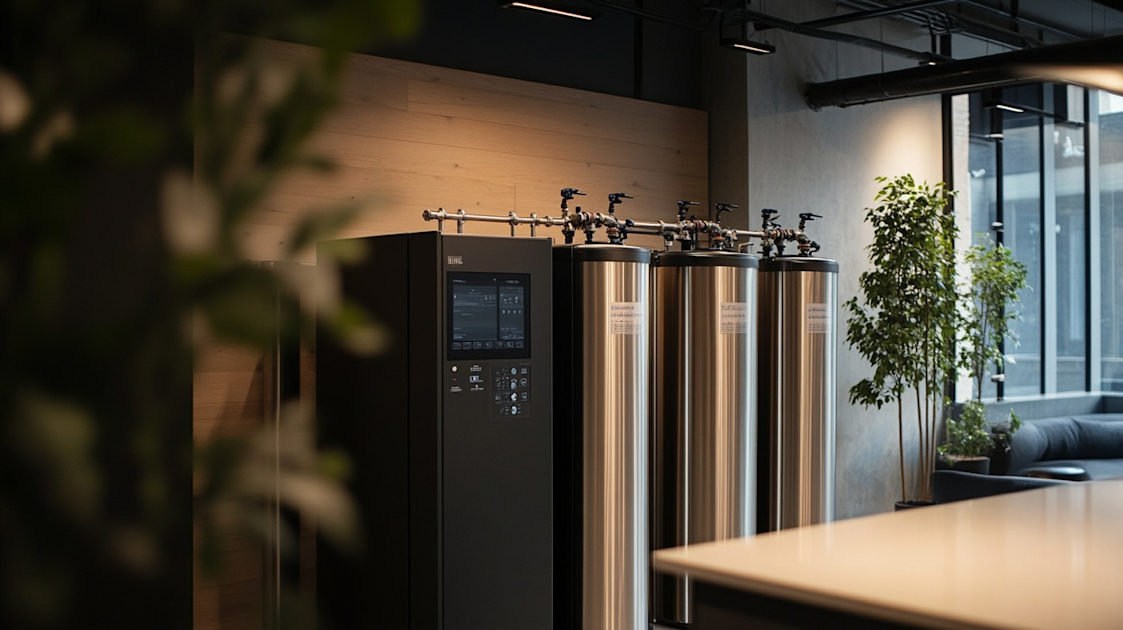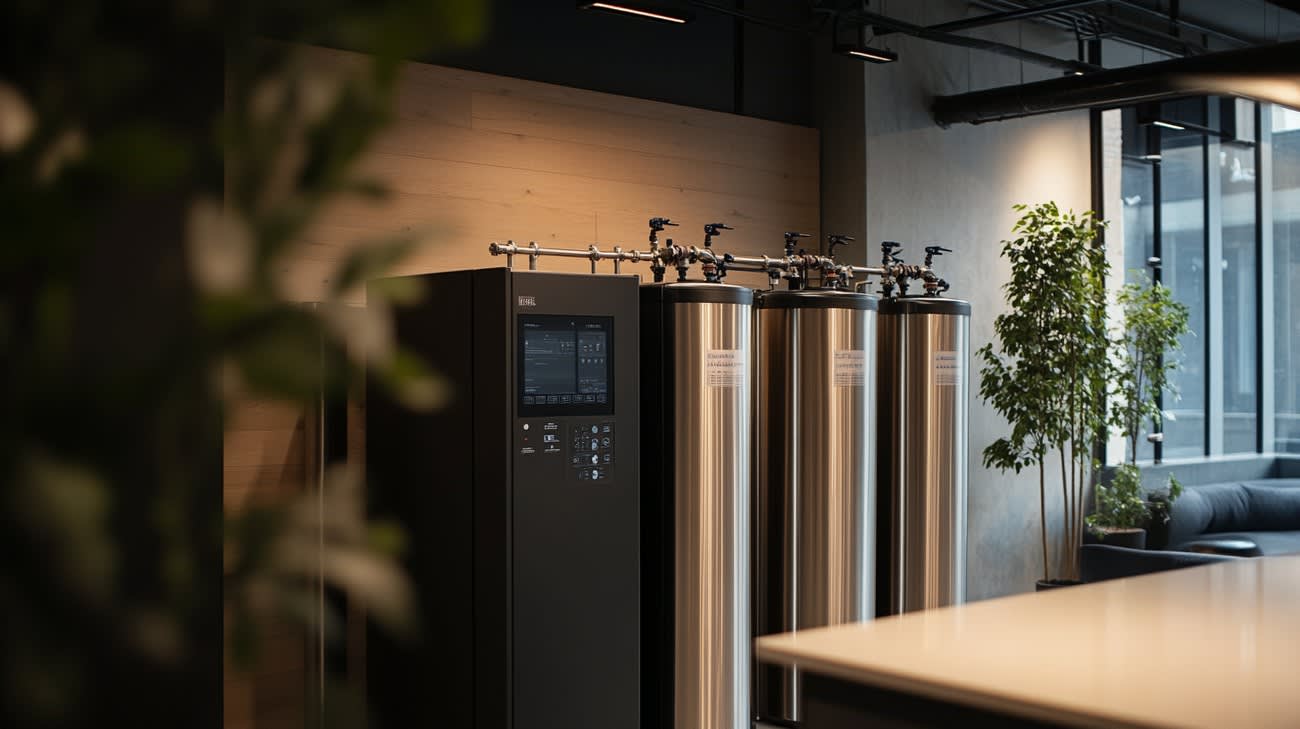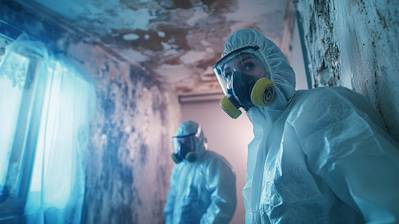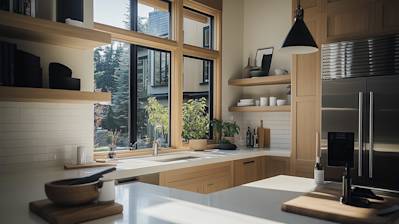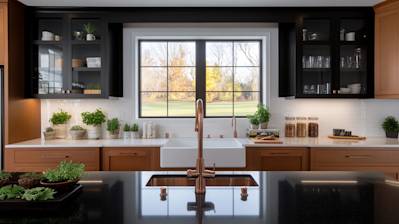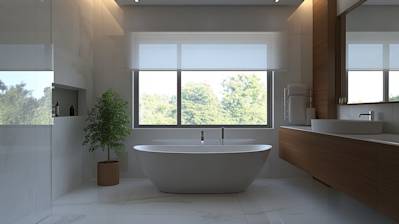The quality of the water that comes into our homes is of utmost importance. Ensuring the water you drink, cook with, and bathe in is safe and pure is a top priority for health and well-being. A whole house water filter is an essential component of a comprehensive approach to water safety and purity in a home. Using advanced filtration technology, a whole house water filter systems can effectively eliminate impurities, improving the quality of water that flows from every tap.
Understanding Whole House Water Filters
A whole house water filter, sometimes referred to as a Point of Entry (POE) system, filters the water as it enters a home's plumbing system. This means that every faucet, shower, and water-using appliance in your home is supplied with pure, filtered water. Unlike Point of Use (POU) systems—which only filter water at specific points, such as a kitchen tap—a whole house water filter provides purified water throughout the entire house.
Key Components of Whole House Water Filters
Typically, whole house water filter systems consist of:
- A sediment pre-filter: This first stage helps capture larger impurities such as sand, dust, and rust.
- An activated carbon filter: Designed to remove chlorine, volatile organic compounds, and other chemical-based contaminants.
- Specialized filters: These are used to target specific pollutants, such as iron or lead.
The Importance of Whole House Water Filters
Whole house water filters are a necessity for households looking to achieve the highest quality of water. Here’s why these systems are crucial:
Improved Drinking Water Quality
Typical tap water can contain impurities such as chlorine, heavy metals, bacteria, and other harmful substances. Whole house water filters effectively remove these contaminants, ensuring the water you drink is clean and healthy.
Better Bathing Quality
Unfiltered water can have negative effects on your skin and hair due to the presence of chlorine and other chemicals. A whole house water filter system eliminates these contaminants, ensuring that your showers and baths are safe and refreshing.
Prevents Scale Buildup
Scale buildup in your pipes and appliances can lead to costly repairs in the future. By eliminating hard minerals from the water supply, whole house water filters can extend the lifespan of your appliances and plumbing systems.
Clean and Safe Water for All Appliances
From your washing machine to your dishwasher, all appliances that use water will benefit from the use of filtered water, assuring better performance and a longer lifespan.
Selecting the Right Whole House Water Filter
The best whole house water filter for your needs will depend on numerous factors, including the quality of your local water supply, the size of your home, and your budget.
Assess Your Water Quality
Before choosing a water filter system, you should test your water to understand what contaminants are in your supply. Water testing kits are available for a quick snapshot of your water quality, or you can hire professionals to perform an in-depth analysis.
Determine the Filter Size
Most whole house water filters come in one of three sizes: small (1-5 microns), medium (5-10 microns), or large (10-50 microns). The smaller the micron rating, the more contaminants the filter can catch.
Calculate the Flow Rate
The flow rate of your filter system should match the water demands of your household. Consider the number of bathrooms, water-using appliances, and the typical water usage habits of your family.
Review the Filter Life
Different filter systems come with varying lifespan. While some filters need to be changed every few months, others can last for several years. Be sure to check the manufacturer’s recommendations for filter replacement.
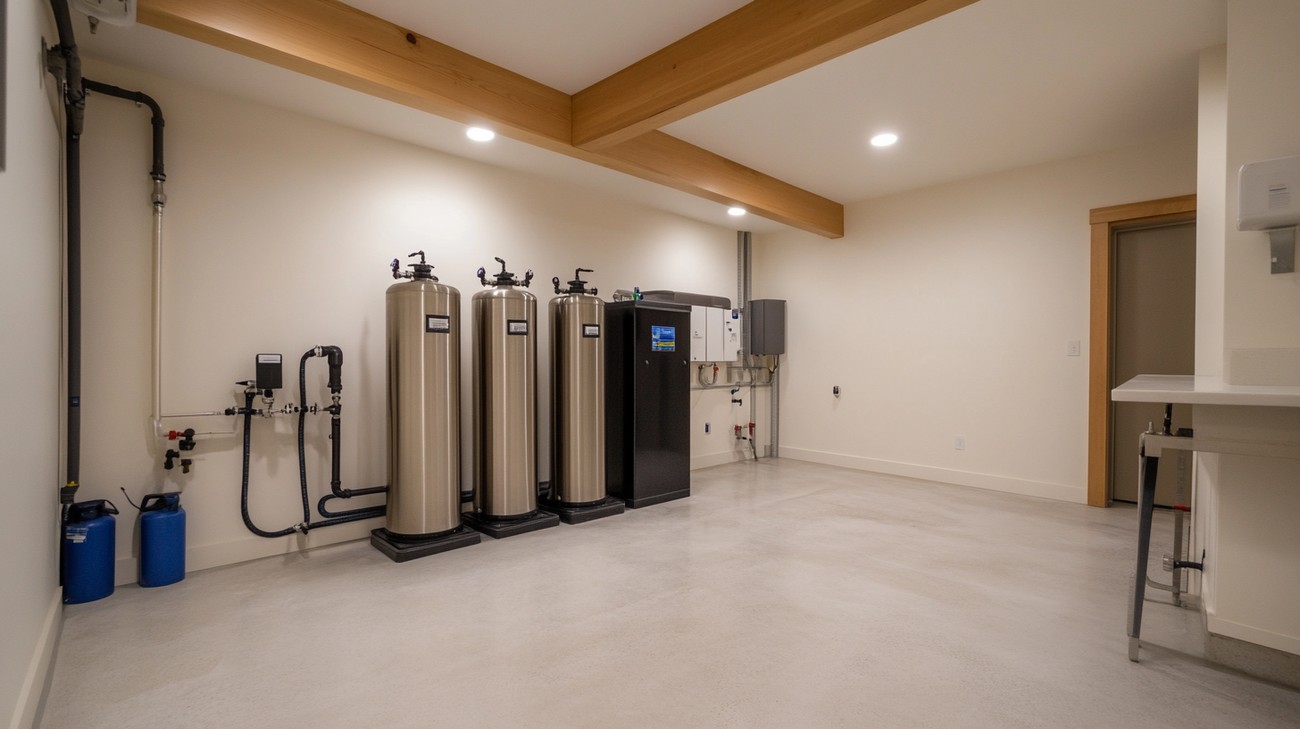
Frequently Asked Questions about Whole House Water Filter
Why Should I Consider a Whole House Water Filter?
Investing in a whole house water filter could be beneficial for numerous reasons. Primarily, it ensures that every water outlet in your home delivers clean, sanitized water, enhancing your family’s health. This filtration system also improves your water's tastes and odors, protects your appliances from scale build-up and can elongate their lifespan.
How Often Should I Change the Filters in My Whole House Water Filter System?
Filter change frequency ultimately depends on the quality of your water and your consumption rate. However, it's a good practice to replace your whole-house water filters every six months or when you've noticed a considerable decline in water pressure. Some high-quality filters may last for about a year or even longer.
Will a Whole House Water Filter Affect My Water Pressure?
Ordinarily, installing a whole house water filter shouldn't significantly affect your water pressure. Still, you may notice a slight change immediately after installation due to the mechanism of action of these systems. Furthermore, if you observe a significant decrease in water pressure, it could indicate that your filter is clogged and needs to be replaced.
Can a Whole House Water Filter Remove Fluoride from My Water?
Whole house water filters can eliminate a wide range of contaminants, but fluoride isn't typically among them. For fluoride removal, consider specialized filtration systems designed primarily for this purpose or use supplementary filters specifically targeted to extract fluoride.
How Much Does a Whole House Water Filter Cost?
The price of whole house water filters varies widely, depending on the brand, model, type, and where you purchase it. You can expect to invest anywhere from $300 to over $1,000, excluding installation costs.
What Maintenance Is Required for a Whole House Water Filter?
Generally, whole house water filters require minimal maintenance. This usually involves changing the cartridges or filters periodically. Each manufacturer will provide specific guidelines on when and how to carry out these maintenance tasks.
How Difficult Is It to Install a Whole House Water Filter?
The installation process for whole house water filters can be somewhat complex, typically involving plumbing work. Most people prefer hiring a professional plumber to ensure correct and safe installation. However, if you are confident with DIY tasks and have some experience with plumbing, you could potentially do the installation yourself.
Can a Whole House Water Filter System Filter Hot Water?
Most whole house water filters are designed to filter cold water. Hot water may degrade the filter and impact its ability to effectively remove contaminants. If you need filtered hot water, consider installing a point-of-use water filter at your hot water outlet.
Pros of Whole House Water Filters
Improved Water Quality
Reduction of Harmful Contaminants
Whole house water filters effectively remove the majority of contaminants and impurities common in tap water, including chlorine, lead, bacteria, and sediment particles. This results in water that is both safer and purer to drink.
Enhancing Taste and Odor
Filtered water is often distinguished by its cleaner, crisper taste and absence of any unpleasant smells. Whole house water filters remove chlorine, bacteria, and other contaminants that often give water a chemical or metallic taste and odor.
Convenient Water Source
Everywhere in the House
Using whole house water filters means that clean, filtered water is readily available from every tap and outlet in your home. Whether you're cooking, drinking, showering, or even watering your backyard, you can rest assured that the water you use is filtered and clean.
Unlimited Supply
Unlike pitcher filters or refrigerator filters that need regular refilling and only provide limited amounts of filtered water, whole house water filters offer an unlimited supply of clean, purified water, 24/7.
Long-Lasting and Cost Effective
Long Lifespan
Whole house water filter systems usually last for several years. The lifespan largely depends on the quality of the water it filters and the capacity of the particular model. Replacements are typically needed every five to ten years.
Cost Efficiency
Though the initial cost of a whole house water filter system can be high, they prove cost-effective over the long term. Considering the lifespan and how much money you can save on bottled water and replacement filters for smaller devices, the investment seems worthwhile.
Healthier Skin and Hair
Impurity-Free Bathing
Chlorine and other chemicals in water can strip the natural oils from your skin and hair, causing dryness and other complications. A whole house water filter removes these harmful substances from all of your home's water, thus reducing the risk of skin and hair issues.
Cons of Whole House Water Filters
Expensive Initial Costs
Installation Costs
The initial cost of purchasing a whole house water filter can be quite high, especially when you factor in the cost of professional installation. Which is often recommended due to the complexity of the installation process.
Maintenance Costs
While the replacements may not be very frequent, they can be quite expensive when the time comes. Depending on the type of system you choose, replacement filters can cost hundreds of dollars.
Installation and Maintenance
Complexity of Installation
The process of installing a whole house water filter system can be complicated and generally requires a professional. It involves plumbing and can take several hours to complete correctly.
Requires Regular Maintenance
To ensure the system continues to operate effectively, regular maintenance and occasional repairs might be necessary. This can be time-consuming and may require hiring a professional, adding to the overall cost.
Not Necessary for All
Dependence on Water Quality
For individuals living in areas where the water supply is already of high quality, the benefits may not outweigh the significant investment required for a whole house water filter system.
Wasted Resources on Low-Usage Outlets
Some water outlets in your home probably don't require filtration. For example, using filtered water for toilets or outdoor watering may seem a waste of resources. In such cases, having individual filters where necessary might be a more reasonable and cost-effective solution.

Myths and Misconceptions About Whole House Water Filters
A whole house water filter is a system designed to treat the water as it enters your home, before it travels through your plumbing and to your faucets or appliances. Like any product, there are some common misunderstandings and misconceptions about whole house water filters. Let's debunk those confusions.
Myth: All Water Filters Are The Same
One of the major misconceptions is that all water filters perform the same task. This is not accurate.
Home vs. Whole House Filters
Many people confuse point-of-use filters, such as faucet or pitcher filters, with whole house water filtration systems. While both types filter water, they do so at different points and may treat different contaminants. Whole house filters treat water as it enters the home, while point-of-use devices filter at the faucet or appliance.
Different Types of Filters
Furthermore, not all whole house water filters are the same. They come in different types, including activated carbon filters, reverse osmosis filters, and sediment filters, each designed to remove specific types of contaminants. The type of filter needed depends on the contaminants present in the local water supply.
Myth: Whole House Water Filters Are Unnecessary
Many people believe that if their water is provided by a municipal system, it is entirely safe and does not need any additional filtration.
Treatable Contaminants
While it's true that municipal water systems treat water to remove many contaminants, these systems often don't eliminate everything. Substances like chlorine, lead, and certain microbes may still be present. Whole house water filters can remove these remaining contaminants, improving the water's taste, odor, and safety.
Pipe Contamination
Additionally, contaminants can also enter the water after treatment, as it travels through old or corroded pipes. A whole house filter treats the water as it enters the home, ensuring it is clean regardless of the state of the plumbing within the house.
Myth: Installing a Whole House Water Filter Will Lower Water Pressure
Another common misconception is that installing a whole house water filter will lower the home's water pressure.
Filter Size and Water Pressure
While the filter can slightly reduce water pressure, this drop is often negligible and unlikely to cause any inconvenience. It largely depends on the size of the filter - larger filters tend to impact water pressure less than smaller ones.
Frequent Filter Maintenance
However, homeowners may experience a significant drop in water pressure if the filter becomes clogged and is not replaced in a timely manner. Regular maintenance is important to keep the system functioning efficiently and the water flowing freely.
Myth: Whole House Water Filters Are Difficult to Install and Maintain
Installing and maintaining a whole house water filter can appear daunting. In reality, they are not as challenging as many think.
Installation Process
Yes, the installation of a whole house water filter requires some plumbing knowledge. However, it usually involves straightforward steps such as cutting a section of the main water line, installing the filter housing, and attaching the filter. Many homeowners can do this themselves, and for those who can't, hiring a plumber for a few hours is all that's needed.
Maintenance Routine
As for maintenance, it primarily involves periodically replacing the filter cartridge. This is generally an easy task that the homeowner can perform.
Myth: Whole House Water Filters Waste Water
Some people believe that whole house water filters waste a significant amount of water. Interestingly, this confusion likely arises from a misunderstanding of reverse osmosis (RO) systems.
The Reverse Osmosis Misconception
RO systems indeed waste some water. They operate by forcing water through a semi-permeable membrane, and some water is flushed out of the system along with the contaminants. However, NOT all whole house filters are RO systems.
Actual Water Use of Whole House Filters
Most whole house filters use methods such as activated carbon filtration or sediment filtration, which do not result in water wastage. They perform their job and do not flush water out of the system. Thus, it's crucial to understand the difference between the various types of water treatment systems.
Myth: Bottled Water is Better than Filtered Water
Some believe that bottled water is safer and of higher quality than filtered water from a whole house water filter.
Bottled Water Concerns
While bottled water is often free from common contaminants, it is not necessarily superior in quality. It can also be a source of plastic-related toxins if stored improperly. Additionally, plastic water bottles are bad for the environment and more expensive over time compared to filtered water.
Quality of Filtered Water
On the other hand, a whole house water filter removes contaminants consistently and provides safer, healthier water from every faucet in your home. Furthermore, the filtered water has no plastic taste, the bottles won't clutter up the environment, and it is cheaper than constantly buying bottled water.
Each of these myths and misconceptions are commonly heard, but when you examine the realities in depth, you'll see a different picture. By understanding these realities, you can make an informed decision about investing in a whole house water filter.
Summary
Overall, investing in a whole house water filter is a wise decision for many reasons. It benefits every member of your household by delivering clean and filtered water straight from every tap. Long-term health benefits, reduced risks, and the convenience factor should definitely be on your mind if you are debating whether to buy this product. You'll surely enjoy the pure taste of your water and the peace of mind the whole house water filter offers by eliminating contaminants.
Furthermore, a whole house water filter is not just beneficial to your health but also kind to your appliances. It prevents the build-up of minerals and sediments in your appliances and plumbing system that can lead to damage and costly repairs. It extends the lifespan of appliances and also makes your home more sustainable. With improved water quality, you can say goodbye to buying bottled water. That’s both a win for your pocket and the environment.
There's more, a whole house water filter is a fit-it-and-forget type of deal. Once installed, it requires minimal maintenance and can last for years without needing to be replaced. Not only does it provide all the benefits mentioned above, but it also does so while requiring very little effort from you. This ease and efficiency make a whole house water filter a worthwhile investment for any homeowner.
About KYPD Plumbing
KYPD Plumbing is your go-to local plumber in Lexington, KY. We have built a name for ourselves over the years through our unrivaled commitment to top-notch quality, impeccable service, and a customer-first mindset. We don't just do pipes and leaks at KYPD, we're experienced in a wide range of plumbing services designed to ensure the smooth running of your homes and businesses. Family-owned and community-oriented, we continually strive to maintain, and exceed, the high standards our customers have come to appreciate us for. With KYPD, you're not just getting plumbing service; you're getting a dedicated partner committed to your total satisfaction.
Tags: water filtration, clean water, home improvement,

